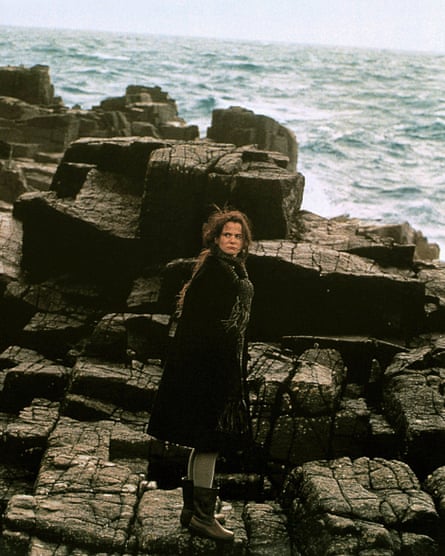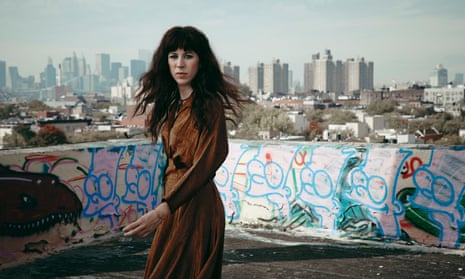Breaking the Waves is one of the most brutal, probing and provocative films ever made about Scotland. It is also one of the most impressively silent. Lars von Trier’s 1996 breakthrough portrays an insular Hebridean community that is fiercely defensive of its values in the face of incomers and offshore oil development. The elders wield religious dogma in an attempt to protect a young woman, Bess McNeill, but their efforts pivot into tyranny and their fear turns xenophobic.
Bess, played with galling vividness by Emily Watson, marries an oil worker called Jan. He becomes paralysed after an accident on the rig and instructs Bess to keep their relationship alive by having sex with other men and then telling him about it. Von Trier shows it all in bleak, intimate and savagely quiet detail. With the exception of chapter interludes charged with 1970s rock (Procol Harum, Roxy Music, Elton John), there is no music underscoring the austere camerawork. We feel the silent scrutiny of an island that has no bells in its church steeple: the elders removed them, believing them a distraction from God.

What happens when you add sound to such formidably oppressive filmic hush? The New York composer Missy Mazzoli has spent years grappling with that question. “Back in 2013,” she says, “my librettist, Royce Vavrek, suggested making an opera out of Breaking the Waves. I said absolutely not: I thought the film was untouchable. But it was a question that wouldn’t leave me alone. The film deals with big ideas about the nature of loyalty, the nature of faith. Opera is a place for big ideas.”
We are speaking at the rehearsal studios of Scottish Opera, whose new production of Mazzoli’s acclaimed work opens in Edinburgh next week. The film is actually packed with classic operatic trademarks. The devoted, mistreated woman – a fixture of Donizetti, Verdi and Puccini. The woman who sacrifices herself for the salvation of a man – Wagner’s redemptive heroines. The seething small-community groupthink to a backdrop of menacing, hallowed seascapes – think Peter Grimes. Mazzoli recognises the weight of that lineage but her broad, brooding post-minimalism carries it lightly.
Mazzoli is a star of the US contemporary classical mainstream. She plays in the Brooklyn band Victoire, which she founded to champion her own work, and is composer-in-residence with the Chicago Symphony Orchestra. She studied with Bang on a Can co-founder David Lang, and shares his knack for lushness cut with sparsity, propulsion studded with unmissable emotive triggers. She tells me that opera thrills her most – that she always wrote instrumental music in a dramatic way, “thinking of instruments as characters, sometimes in opposition to each other, sometimes together, but always with personality. So the leap to opera was natural. It felt like something I’d been waiting for, nothing short of meeting my destiny.”
When Opera Philadelphia commissioned Breaking the Waves for its 2016 season, she took a trip to Scotland with Vavrek. “We didn’t know why it was important until we got here and immersed ourselves in the Isle of Skye,” she says. “It overtook me like waves.” Von Trier shot much of his film on Skye, though his setting is an invention: there are no oil rigs on the Scottish west coast, but the religion of the film points to the Hebrides.
For Mazzoli, that sense of place is key. References to Skye are, she says, “delicious in the music”. Her ears pricked up at the accents – “a gift for vocal lines! This one man spoke about being ‘hefted to the hill’. I could hear the music of that phrase instantly.” She also asked locals about their experience of Scottish Free Presbyterianism in the 70s. One woman recalled the walk to church every Sunday, with the whole village noting who did or did not attend.
Above all, Mazzoli’s creative mind was set racing by the landscape. “Rare for me,” she admits. “Ninety-nine percent of my work is inspired by human drama, the inner life of interesting people. But the very first chord in the opera is a direct response to a place called The Brother’s Point. A lush meadow, sheep grazing, then a sharp point dropping off into a cliff and waves crashing. That combination of soft and rough – it’s a landscape that’s almost sexy in its lushness. I knew the music had to start like that. The vibe of it was crystal clear.”
She is nervous about bringing the opera to Scotland – “There’s nothing worse than an American telling people what their country is like” – and stresses that although the music is thick with Hebridean atmosphere, it is not a portrait of anywhere. “In portraying the religious men, we’re not making a statement about the men of Skye. We’re making a statement about the patriarchy of religion.”

Not for the last time, Von Trier’s film attracted controversy for its extreme scenes of humiliating sex and female debasement. Does Bess suffer for the benefit of Jan’s fantasies and – ultimately – for our entertainment? Mazzoli doesn’t see it that way. “A lot of people talk about his treatment of actresses. I’m not interested in that. I’ve never met the man. The point for me is that I don’t think this film is misogynist. There’s an interesting ambiguity in Jan’s motivations but I believe his motivation is pure. It has to be a true love story.”
Mazzoli says she has not written a feminist opera – “It’s preoccupied with other themes” – but describes it as the story of a woman “in an impossible situation. Everyone around her is telling her what to do and how to act. And they’re all telling her contradictory things. They’re punishing her for falling off the line of acceptable behaviour, which in reality is impossibly thin. As a woman, I can definitely relate to that. It’s how I feel, and to a greater extent how all the older women in my family have felt. The old madonna/whore thing: you’re supposed to be pure, but you’re also supposed to please men through your body. You can’t win because you’re either a slut or a prude. You’re constantly falling on either side of the line.”
Von Trier called it a story about goodness – what can go wrong even when everyone tries to act in a way they believe to be right. Watching the film, it is hard to feel compassion towards the elders of the community – and that is where Mazzoli hopes her music can contribute nuance. While the church councilman berates Bess with cruel words, Mazzoli writes him lush cascading lines. “I can shade every word in one direction or the other. It’s why I love opera. I can contradict what’s assumed.”
Above all, her music lets us into Bess’s head. More than that: in a sense, Bess conjures the whole opera. Her community is silent, but she loves music. “Maybe she is music,” Mazzoli suggests. So while we might expect those rough waves and gentle meadows to come from the orchestra, instead Mazzoli gives us a sumptuous electronic soundscape that emerges from the ether. It is as if we are hearing Bess’s unbridled imagination, and only when the music spills into the pit and is taken up by the instruments do we come crashing down to earth.
It is a tremendously powerful idea – an operatically transfigurative idea – as if the entire work, the entire genre, becomes the spirit Bess can’t set free in the film. If ever Mazzoli was concerned about what opera might add to Von Trier’s supernatural epic, here is the answer.
